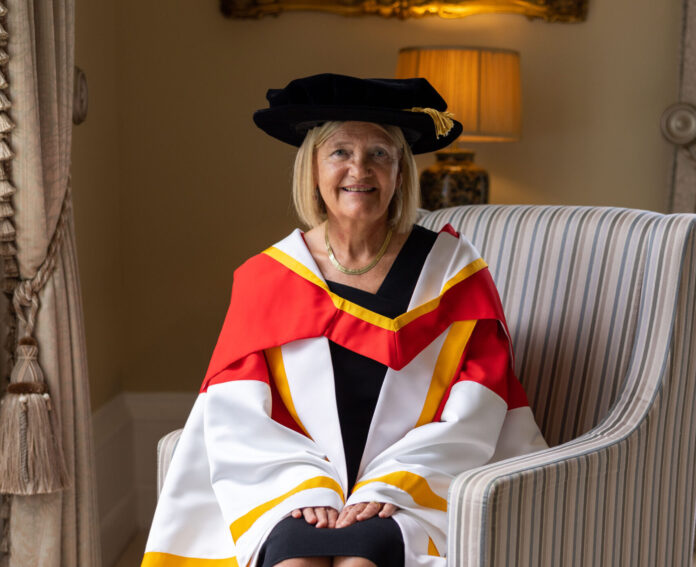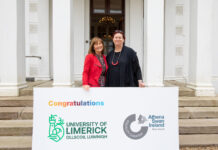THE CHANCELLOR of the University of Limerick, Professor Brigid Laffan, has said there must be “accountability” over the latest financial controversy to rock the third level institution, expressing her belief that UL has “not bottomed out in terms of governance of capital acquisitions”.
The university’s president, Professor Kerstin Mey, revealed last week that UL had significantly overspent on the purchase of 20 houses for student accommodation in Rhebogue, County Limerick, costing €11.4million and leaving it with a €5m deficit on its accounts.
The homes were subsequently independently valued at just €6.4m.
This latest property acquisition controversy comes after UL admitted last year that it had significantly overpaid for the former Dunnes Stores site at Harvey’s Quay in Limerick City.
The university confirmed that it has spent €8.3m on the landmark city site without having a formal valuation, and despite the fact that the site had been valued at €3m just two years earlier.
According to reports by the Irish Examiner, Professor Mey said she would not be able to meet a scheduled appearance before the Oireachtas Public Accounts Committee (PAC) on April 11 and declared she had taken sick leave – the duration of which is not currently known.
Professor Mey informed the PAC on March 22 that she was “incapacitated and therefore cannot honour our commitment to attend on 11 April 2024”, adding that she would “make every effort to attend at a future date in the current term”.
In another email sent on the same day, Professor Mey told UL staff that the university had significantly overspent on the 20 houses in Rhebogue and that the matter would be investigated.
Speaking before a public meeting of UL staff, students, and stake holders on Thursday (March 28), UL chancellor Professor Brigid Laffan – who said she had flown in from abroad in the early hours of Thursday morning to attend the emergency address – told those in attendance that “I accept we have a university to change, and we will do that”.
Professor Laffan told the meeting that the Higher Education Authority (HEA) formally demanded that a Section 64 investigation be carried out into the Rhebogue overspend. Such reviews effectively mean, Professor Laffan said, that UL “will not be in a position to agree our own terms of reference for this review. We will have to engage actively with the HEA on the terms of reference.”
“I think that’s very good. This university can’t afford a continuation forever of what’s going on. So the sooner we get the Section 64 up and running, the better.”
The UL chancellor also told the hundreds gathered in the University Concert Hall that the HEA will be on the university’s campus from April 23 to 25 to discuss the investigation’s terms of reference.
She said, once the investigation is complete, “it is the HEA’s attention to publish that report”.
Professor Laffan, who was appointed to the chancellor’s role in November, after the Rhebogue purchase had been finalised, admitted that the property overspend, especially so soon after the controversy over the Dunnes Stores site, was “completely shocking and alarming”, adding that the university had still “not bottomed out in terms of governance of capital acquisitions”.
She said that when she had learned the details of the overspend following a fact-finding review by UL Governing Authority’s Audit and Risk Committee, she “knew that we had a problem, a very serious governance problem, around the capital acquisition. And I can’t describe to you what the last week has been like.”
“Over the last week, things have come to a head. And, as you know, the university will have a serious impairment on the basis of that capital acquisition of €5million plus. And can I just say, as an academic, I know how hard it is to get your expenses from universities for cups of coffee or travel or whatever. So €5million is a very large sum of money.”
Reading out a letter sent by the HEA to the university, Professor Laffan said that the educational authority expressed “in the context of the previous work the HEA has undertaken with UL in relation to the Dunnes Stores site… deepest concerns in relation to the governance and culture of the institution”.
Professor Laffan told the meeting that the first priority of UL’s Governing Authority is to “ensure that what happened with Rhebogue never happens again”.
“And that might be seen as cheap talk because I’m sure equivalent statements were made after Dunnes Stores, but I will guarantee you that we will put in place the governance systems that will not allow this to happen again.
“Because I have no interest in being the chancellor of this university for the next four years unless we really get to the bottom of the university to change.
“A second priority is to ensure accountability. There must be accountability for actions taken.”
Following Professor Laffan’s address, Professor Eoin Devereux, convenor of UL staff union UL Unite, told the Chancellor that her assurances “stand as an antidote to the oppressive organisational culture which has come into play in some circumstances in UL in recent years”.
Reiterating the sentiments of a formal letter expressing no confidence in Professor Mey, he said that, despite assurances of the Section 64 review and guarantees of change from Professor Laffan, “lest there be any misunderstanding, the position of UL Unite concerning the leadership, management, and governance of this university has not changed”.
“Our position is consistent with the views expressed in writing by 10 members of the university executive, 73 professors, the Postgraduate Students’ Union, and a number of faculty and management groups in the university.”
Professor Devereux told Professor Laffan that “we do not need another UL solution for a UL problem”.
The UL Governing Authority met after Thursday’s public meeting and described the €5m overspend on the Rhebogue properties as a “serious impairment” in UL’s 2023 end of year financial statements.
The Authority said it had “reviewed and considered” the findings of the independent fact-finding report that had been commissioned in February “to establish the facts in relation to the acquisition of the properties”.
It said it had determined that certain university personnel should be afforded the opportunity to review the report’s content and submit written observations on its findings, adding that “once responses have been received, the Governing Authority will meet to determine the appropriate next steps”.











